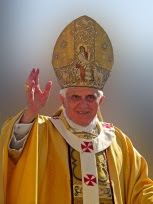 You must be holy in the way that God asks you to be holy. God does not ask you to be a Trappist monk or a hermit. He wills that you sanctify the world and your everyday life.
You must be holy in the way that God asks you to be holy. God does not ask you to be a Trappist monk or a hermit. He wills that you sanctify the world and your everyday life.--St. Vincent Pallotti
Catholic quotations from the Church Doctors, Church Fathers and all the great Catholic minds.
 You must be holy in the way that God asks you to be holy. God does not ask you to be a Trappist monk or a hermit. He wills that you sanctify the world and your everyday life.
You must be holy in the way that God asks you to be holy. God does not ask you to be a Trappist monk or a hermit. He wills that you sanctify the world and your everyday life. Abortion is the only event that modern liberals think too violent and obscene to portray on TV. This is not because they are squeamish or prudish. It is because if people knew what abortion really looked like, it would destroy their pretence that it is a civilized answer to the problem of what to do about unwanted babies.
Abortion is the only event that modern liberals think too violent and obscene to portray on TV. This is not because they are squeamish or prudish. It is because if people knew what abortion really looked like, it would destroy their pretence that it is a civilized answer to the problem of what to do about unwanted babies. Till you know the weight of your sins, and that not in mere imagination, but in practice, not so as merely to confess it in a formal phrase of lamentation, but daily and in your heart in secret, you cannot embrace the offer of mercy held out to you in the Gospel, through the death of Christ.
Till you know the weight of your sins, and that not in mere imagination, but in practice, not so as merely to confess it in a formal phrase of lamentation, but daily and in your heart in secret, you cannot embrace the offer of mercy held out to you in the Gospel, through the death of Christ.  The blood of Jesus cries out, and asks mercy for us; and cries out so loudly that the noise of our sins is not heard.
The blood of Jesus cries out, and asks mercy for us; and cries out so loudly that the noise of our sins is not heard. God’s sign is simplicity. God’s sign is the baby. God’s sign is that he makes himself small for us. This is how he reigns. He does not come with power and outward splendour. He comes as a baby – defenceless and in need of our help. He does not want to overwhelm us with his strength. He takes away our fear of his greatness. He asks for our love: so he makes himself a child. He wants nothing other from us than our love, through which we spontaneously learn to enter into his feelings, his thoughts and his will – we learn to live with him and to practise with him that humility of renunciation that belongs to the very essence of love. God made himself small so that we could understand him, welcome him, and love him.
God’s sign is simplicity. God’s sign is the baby. God’s sign is that he makes himself small for us. This is how he reigns. He does not come with power and outward splendour. He comes as a baby – defenceless and in need of our help. He does not want to overwhelm us with his strength. He takes away our fear of his greatness. He asks for our love: so he makes himself a child. He wants nothing other from us than our love, through which we spontaneously learn to enter into his feelings, his thoughts and his will – we learn to live with him and to practise with him that humility of renunciation that belongs to the very essence of love. God made himself small so that we could understand him, welcome him, and love him. It is true that we shall have to render a rigorous account to the Eternal Judge of all our sins. But who is to be our Judge? The Father hath committed all judgment to the Son. Let us comfort ourselves, the Eternal Father has committed our judgment to our own Redeemer. Therefore, St. Paul encourages us, saying, Who is he that shall condemn? Christ Jesus who died, . . . who also maketh intercession for us. Who is the judge to condemn us? It is that same Saviour who, in order not to condemn us to everlasting death, vouchsafed himself to be condemned and to die; and not content with this, at this moment intercedes with his Father for our salvation.
It is true that we shall have to render a rigorous account to the Eternal Judge of all our sins. But who is to be our Judge? The Father hath committed all judgment to the Son. Let us comfort ourselves, the Eternal Father has committed our judgment to our own Redeemer. Therefore, St. Paul encourages us, saying, Who is he that shall condemn? Christ Jesus who died, . . . who also maketh intercession for us. Who is the judge to condemn us? It is that same Saviour who, in order not to condemn us to everlasting death, vouchsafed himself to be condemned and to die; and not content with this, at this moment intercedes with his Father for our salvation.  Whenever an occasion of disagreement arises because of natural differences of opinion, no matter how sure you may be that you are right, be glad to give up your own opinion and yield to that of someone else, provided the glory of God be not concerned in the matter.
Whenever an occasion of disagreement arises because of natural differences of opinion, no matter how sure you may be that you are right, be glad to give up your own opinion and yield to that of someone else, provided the glory of God be not concerned in the matter. In our time more than ever before, the chief strength of the wicked, lies in the cowardice and weakness of good men.
In our time more than ever before, the chief strength of the wicked, lies in the cowardice and weakness of good men. The great majority of people will go on observing forms that cannot be explained; they will keep Christmas Day with Christmas gifts and Christmas benedictions; they will continue to do it; and some day suddenly wake up and discover why.
The great majority of people will go on observing forms that cannot be explained; they will keep Christmas Day with Christmas gifts and Christmas benedictions; they will continue to do it; and some day suddenly wake up and discover why. The precept to love our neighbor requires us to be not only well-wishers, but well-doers.
The precept to love our neighbor requires us to be not only well-wishers, but well-doers. The fear of God is the beginning of wisdom; till you see Him to be a consuming fire, and approach Him with reverence and godly fear, as being sinners, you are not even in sight of the strait gate.
The fear of God is the beginning of wisdom; till you see Him to be a consuming fire, and approach Him with reverence and godly fear, as being sinners, you are not even in sight of the strait gate.  We must not believe the Evil One when he tells us that there is nothing we can do in the face of violence, injustice and sin.
We must not believe the Evil One when he tells us that there is nothing we can do in the face of violence, injustice and sin. The ambivalence of the concept of Magi that we find here illustrates the ambivalence of religion in general. It can become the path to true knowledge, the path to Jesus Christ. But when it fails, in his presence, to open up to him and actually opposes the one God and Saviour, it becomes demonic and destructive.
The ambivalence of the concept of Magi that we find here illustrates the ambivalence of religion in general. It can become the path to true knowledge, the path to Jesus Christ. But when it fails, in his presence, to open up to him and actually opposes the one God and Saviour, it becomes demonic and destructive. In Holy Communion Jesus unites himself to the soul, and the soul to Jesus; and this is not a union of mere affection, but it is a true and real union.
In Holy Communion Jesus unites himself to the soul, and the soul to Jesus; and this is not a union of mere affection, but it is a true and real union.  There is no more dangerous or disgusting habit than that of celebrating Christmas before it comes, as I am doing in this article. It is the very essence of a festival that it breaks upon one brilliantly and abruptly, that at one moment the great day is not and the next moment the great day is.
There is no more dangerous or disgusting habit than that of celebrating Christmas before it comes, as I am doing in this article. It is the very essence of a festival that it breaks upon one brilliantly and abruptly, that at one moment the great day is not and the next moment the great day is. The precept to love our neighbor requires us to be not only well-wishers, but well-doers.
The precept to love our neighbor requires us to be not only well-wishers, but well-doers. If you bear this cross and burden well, He will send you interior and more painful trials, which He keeps for His dearest friends, to conform them to Himself. For though Christ's visible cross was great, it was not to be compared to that which, unknown to men, He bore in His soul.
If you bear this cross and burden well, He will send you interior and more painful trials, which He keeps for His dearest friends, to conform them to Himself. For though Christ's visible cross was great, it was not to be compared to that which, unknown to men, He bore in His soul. On the other hand, the form of doctrine, which I have called the religion of the day, is especially adapted to please men of sceptical minds, the opposite extreme to those just mentioned, who have never been careful to obey their conscience, who cultivate the intellect without disciplining the heart, and who allow themselves to speculate freely about what religion ought to be, without going to Scripture to discover what it really is.
On the other hand, the form of doctrine, which I have called the religion of the day, is especially adapted to please men of sceptical minds, the opposite extreme to those just mentioned, who have never been careful to obey their conscience, who cultivate the intellect without disciplining the heart, and who allow themselves to speculate freely about what religion ought to be, without going to Scripture to discover what it really is. As long as you are proud you cannot know God. A proud man is always looking down on things and people: and, of course, as long as you are looking down, you cannot see something that is above you.
As long as you are proud you cannot know God. A proud man is always looking down on things and people: and, of course, as long as you are looking down, you cannot see something that is above you. If I desire and seek God's will, what does it matter whether it be presented in tribulation or consolation?
If I desire and seek God's will, what does it matter whether it be presented in tribulation or consolation?  As long as we love the things of the world we lose the fruits of divine love. We cannot serve two masters.
As long as we love the things of the world we lose the fruits of divine love. We cannot serve two masters.  As long as you seek out and love the company of men of the world, Jesus Christ whose delight it is to be with the children of men will not take His delight in you and will not give you any taste of the consolations with which He refreshes those who find all their joy in conversing with Him.
As long as you seek out and love the company of men of the world, Jesus Christ whose delight it is to be with the children of men will not take His delight in you and will not give you any taste of the consolations with which He refreshes those who find all their joy in conversing with Him. But in order to arrive at the perfect love of Jesus Christ, we must adopt the means. Behold, then, the means which St. Thomas Aquinas gives us:
But in order to arrive at the perfect love of Jesus Christ, we must adopt the means. Behold, then, the means which St. Thomas Aquinas gives us: If man excuses himself, God accuses him; if man accuses himself, God excuses him.
If man excuses himself, God accuses him; if man accuses himself, God excuses him.  Christ sought not to gain fisherman through the orator, but by the fisherman, the emperor.
Christ sought not to gain fisherman through the orator, but by the fisherman, the emperor.  The glutton exceeds moderation either in what he eats, how much he eats, how he eats, or when he eats.
The glutton exceeds moderation either in what he eats, how much he eats, how he eats, or when he eats.  Now conscience is a stern, gloomy principle; it tells us of guilt and of prospective punishment. Accordingly, when its terrors disappear, then disappear also, in the creed of the day, those fearful images of Divine wrath with which the Scriptures abound. They are explained away. Every thing is bright and cheerful. Religion is pleasant and easy; benevolence is the chief virtue; intolerance, bigotry, excess of zeal, are the first of sins.
Now conscience is a stern, gloomy principle; it tells us of guilt and of prospective punishment. Accordingly, when its terrors disappear, then disappear also, in the creed of the day, those fearful images of Divine wrath with which the Scriptures abound. They are explained away. Every thing is bright and cheerful. Religion is pleasant and easy; benevolence is the chief virtue; intolerance, bigotry, excess of zeal, are the first of sins. Above all, you must be rid of the hideous idea, fruit of a widespread inferiority complex, that pomp, on the proper occasions, has any connexion with vanity or self-conceit. A celebrant approaching the altar, a princess led out by a king to dance a minuet, a general officer on a ceremonial parade, a major-domo preceding the boar’s head at a Christmas feast — all these wear unusual clothes and move with calculated dignity. This does not mean that they are vain, but that they are obedient; they are obeying the hoc age which presides over every solemnity. The modern habit of doing ceremonial things unceremoniously is no proof of humility; rather it proves the offender’s inability to forget himself in the rite, and his readiness to spoil for every one else the proper pleasure of ritual.
Above all, you must be rid of the hideous idea, fruit of a widespread inferiority complex, that pomp, on the proper occasions, has any connexion with vanity or self-conceit. A celebrant approaching the altar, a princess led out by a king to dance a minuet, a general officer on a ceremonial parade, a major-domo preceding the boar’s head at a Christmas feast — all these wear unusual clothes and move with calculated dignity. This does not mean that they are vain, but that they are obedient; they are obeying the hoc age which presides over every solemnity. The modern habit of doing ceremonial things unceremoniously is no proof of humility; rather it proves the offender’s inability to forget himself in the rite, and his readiness to spoil for every one else the proper pleasure of ritual. When the devil cannot turn a soul away from virtue, he tries to urge it to excessive mortification.
When the devil cannot turn a soul away from virtue, he tries to urge it to excessive mortification.  For you must keep in mind that the shedding of Our Lord's blood and the sacrifice of His life were just as necessary to wipe out venial sin as to deliver you from mortal sin. Remember that anyone who attaches little importance to venial sin will soon fall into mortal sin. If you do not find these resolutions in you own soul, pray to Our Lord to put them there, and do not rest until you possess these dispositions. For you ought to know that as long as you do not have the will to die or suffer every kind of disgrace and torture rather than commit any sin, you are not a true Christian.
For you must keep in mind that the shedding of Our Lord's blood and the sacrifice of His life were just as necessary to wipe out venial sin as to deliver you from mortal sin. Remember that anyone who attaches little importance to venial sin will soon fall into mortal sin. If you do not find these resolutions in you own soul, pray to Our Lord to put them there, and do not rest until you possess these dispositions. For you ought to know that as long as you do not have the will to die or suffer every kind of disgrace and torture rather than commit any sin, you are not a true Christian. The Western post-Christian civilization has picked up the Christ without His Cross. But a Christ without a sacrifice that reconciles the world to God is a cheap, colorless, itinerant preacher who deserves to be popular for His great Sermon on the Mount, but also merits unpopularity for what He said about His Divinity on the one hand, and divorce, judgment, and hell on the other. This sentimental Christ is patched together with a thousand commonplaces, sustained sometimes by academic etymologists who cannot see the Word for the letters, or distorted beyond personal recognition by a dogmatic principle that anything which is Divine must necessarily be a myth. Without His Cross, He becomes nothing more than a sultry precursor of democracy or a humanitarian who taught brotherhood without tears.
The Western post-Christian civilization has picked up the Christ without His Cross. But a Christ without a sacrifice that reconciles the world to God is a cheap, colorless, itinerant preacher who deserves to be popular for His great Sermon on the Mount, but also merits unpopularity for what He said about His Divinity on the one hand, and divorce, judgment, and hell on the other. This sentimental Christ is patched together with a thousand commonplaces, sustained sometimes by academic etymologists who cannot see the Word for the letters, or distorted beyond personal recognition by a dogmatic principle that anything which is Divine must necessarily be a myth. Without His Cross, He becomes nothing more than a sultry precursor of democracy or a humanitarian who taught brotherhood without tears. Under no circumstances can we conceive of the possibility of change, of evolution, or of any modification in matters of faith. The Creed remains always the same.
Under no circumstances can we conceive of the possibility of change, of evolution, or of any modification in matters of faith. The Creed remains always the same. Some saints are privileged to extend to us their patronage with particular efficacy in certain needs, but not in others; but our holy patron St. Joseph has the power to assist us in all cases, in every necessity, in every undertaking.
Some saints are privileged to extend to us their patronage with particular efficacy in certain needs, but not in others; but our holy patron St. Joseph has the power to assist us in all cases, in every necessity, in every undertaking. It costs God nothing, so far as we know, to create nice things: but to convert rebellious wills cost Him crucifixion.
It costs God nothing, so far as we know, to create nice things: but to convert rebellious wills cost Him crucifixion.  To examine whether your heart please Him is not necessary, but rather whether His heart pleases you.
To examine whether your heart please Him is not necessary, but rather whether His heart pleases you. On the Way of the Cross, you see, my children, only the first step is painful. Our greatest cross is the fear of crosses. . . . We have not the courage to carry our cross, and we are very much mistaken; for, whatever we do, the cross holds us tight - we cannot escape from it. What, then, have we to lose? Why not love our crosses and make use of them to take us to Heaven?
On the Way of the Cross, you see, my children, only the first step is painful. Our greatest cross is the fear of crosses. . . . We have not the courage to carry our cross, and we are very much mistaken; for, whatever we do, the cross holds us tight - we cannot escape from it. What, then, have we to lose? Why not love our crosses and make use of them to take us to Heaven?  As long as you do not have the will to die or suffer every kind of disgrace and torture rather than commit any sin, you are not a true Christian
As long as you do not have the will to die or suffer every kind of disgrace and torture rather than commit any sin, you are not a true Christian You want people to suffer forever in hell but you don't want to hurt their feelings now? What kind of love is that?
You want people to suffer forever in hell but you don't want to hurt their feelings now? What kind of love is that?